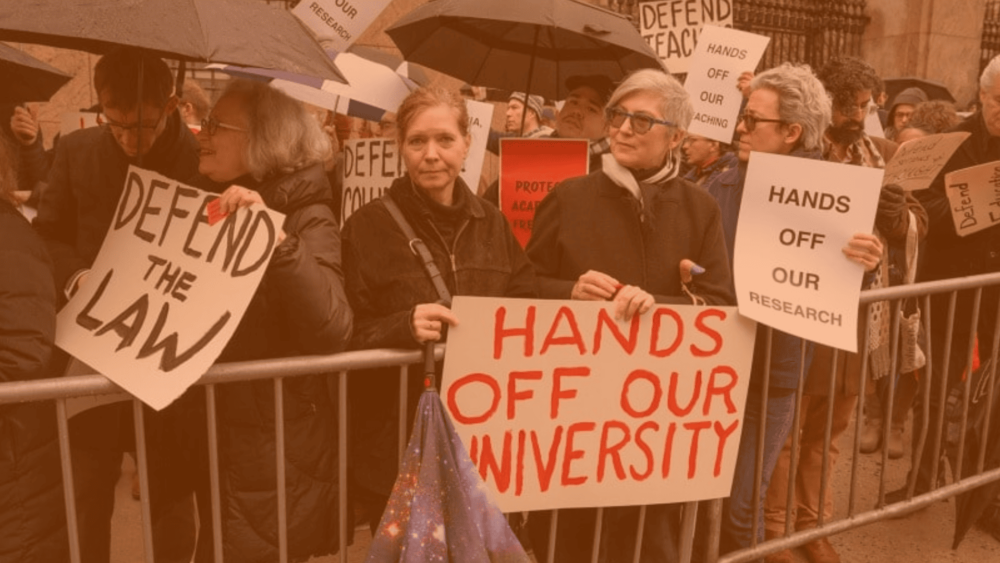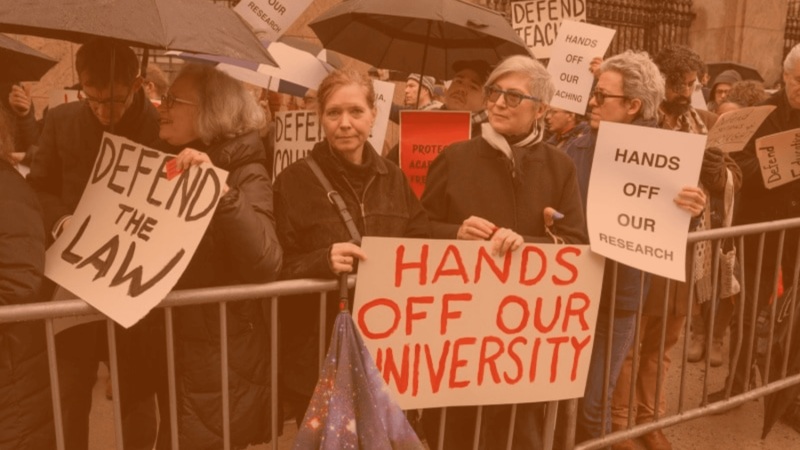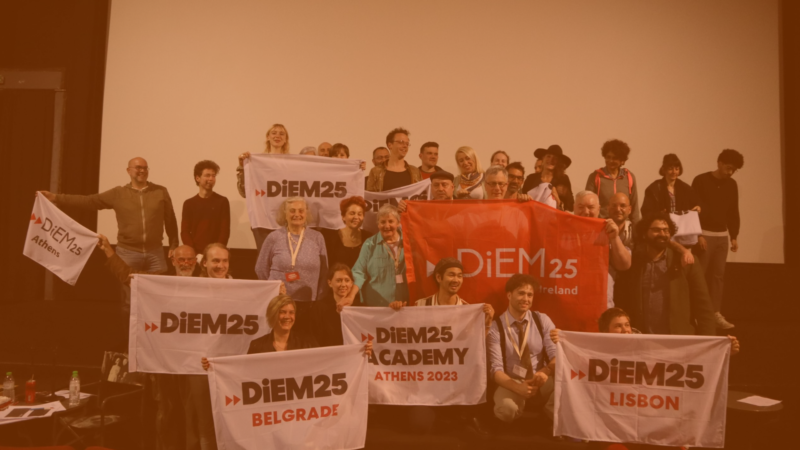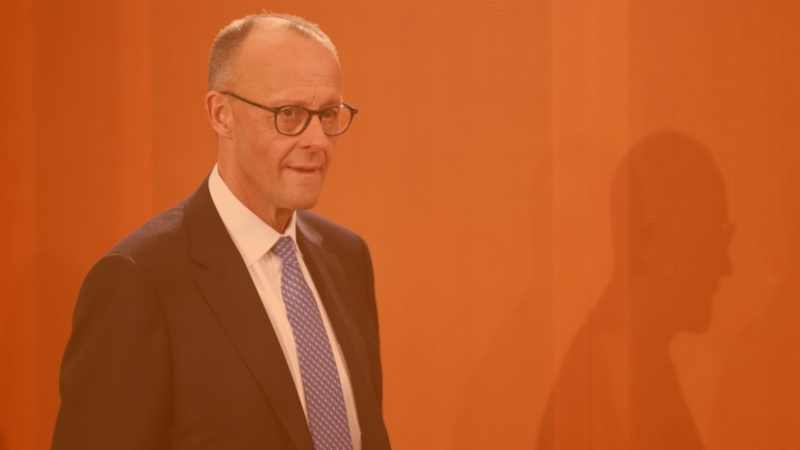This essay is published anonymously by members of MeRA25 residing in the United States, who face tangible risks under the Trump administration’s escalating authoritarianism. Despite holding valid residency permits, they – like countless others – are subjected to retaliatory measures (arrests, deportations, raids) for exercising their right to dissent, even on social media or at protests. Such repression, reminiscent of despotic regimes, underscores a harrowing erosion of democratic norms.
The authors, scholars with decades of contributions to U.S. academia, expose how universities’ complicity with corporate and political power has enabled this decay. Their anonymity is a necessity, not a choice – a damning indictment of America’s declining free speech. We respect their fears while standing in solidarity with their courage, and we condemn a system that forces silence.
(The writer wishes to remain anonymous as a way of safeguarding from retribution for the views expressed in this essay.)
Democratic institutions must be brought to heel if authoritarianism is to take root. It is a tenet that Donald Trump understands well as he seeks to subjugate the best American universities. His excuse for waging war on universities is their failure to stop antisemitism; his weapon is federal research funding. In reality, antisemitism is a stand-in for Leftist politics, which find expression on campuses, exactly because American universities have safeguarded democratic values, such as the freedom of speech, the freedom of inquiry, pluralism, debate, and tolerance of opposing positions.
While Trump’s treatment of Columbia, Harvard, Princeton, the University of Pennsylvania, Brown, and tens of other universities is widely deemed as a threat to American society, what is less recognized is that universities have long operated in ways that now make them vulnerable to an authoritarian ruler. An economic analysis reveals why Trump can exercise such power over universities and their impotence in protecting themselves from him.
Universities rely on billions in US Government funding to conduct research that ostensibly produces public goods, such as life-saving cures for disease. But once invented in university labs, these public goods often turn to private goods, as universities license their intellectual property to companies that bring technologies to market. The US Government, for example, invested tens of billions of dollars, over many years, in the research that led to the development of the mRNA COVID-19 vaccine. Yet it was private pharmaceutical companies that reaped the profits during the pandemic.
University leaders have sought to defend themselves from Trump’s assault by asserting that freezing federal grants jeopardizes essential scientific advancements. The assertion, which universities make publicly in their defence is only partially true. What is overlooked is the role of universities in using public funds to enrich corporations, some of which are openly supporting Trump. Elon Musk’s Tesla is the most prominent example of such a corporation. Tesla has long benefitted from government funded academic research in electric vehicles and battery technology. There are countless such interconnections among government, universities, and corporations, including the advent and monetization of ubiquitous technologies, such as the internet.
American universities, too, have sacrificed their moral authority to their financial interests. This trade-off has been in full display since Israel commenced its genocide of the Palestinians in Gaza in October 2023. Most of the universities on Trump’s target list rejected students’ demands to divest from the corporations, such as the arms manufacturers, that are benefitting from Israel’s war because universities deemed it more important to protect their finances than to disassociate from a war crime. Universities previously made the same trade-offs in refusing to divest from South Africa under apartheid, and again when called upon to divest from fossil fuel companies. That these elite universities are governed by, and require the charity of, wealthy alumni helps to understand the reason that universities prioritize the protection of their endowments rather than their academic missions.
The assault on universities began with Columbia, when the Trump administration froze $400 million in grants. In the days that followed, a pall settled on other university campuses, as they braced for their turn from the Trump administration. On my own campus, one could sense the defensive posture, the dread of attracting the tyrant’s attention. That sort of fear, and the self-censorship that stems from it, were already pervasive on college campuses and tolerated by university administrators in the wake of Israel’s war on Gaza. Except for the student protesters, most of us who have deemed the war an injustice kept silent lest we be falsely accused of being anti-Semites.
Several of the universities that are under attack, of course, did more than tolerate this false narrative. They quashed the student protest movement; they kept silent as students’ private information was publicized in retribution for their support of Palestinian liberation; they reinforced the propaganda that criticism of Israel’s colonial project was tantamount to antisemitism. And they continue to do so today. Cornell University, for instance, cancelled a performance by Kehlani, because she has been outspoken in her opposition to the genocide in Gaza. Cornell’s went as far as to cite the use of the word, “intifada,” in Kehlani’s lyrics as an indication of her purported antisemitism. That any peoples have the right to resist their occupiers mattered not at all.
It is deeply ironic that Trump has branded universities as antisemitic, Marxist, and unpatriotic. For 20 years, I have been part of several of the universities on his hit list. What I have observed is a vastly different reality: countless Jewish scholars and scientists among the ranks of the faculty; the university as a haven for an impotent academic Left; and an overwhelming majority of elitist liberals and conservatives, who espouse capitalism, including the privatization of publicly funded research outputs, corporatism, and who are ideologically and materially wedded to the status quo. It is this majority, which has long played by the rules, and that now finds itself at a loss against authoritarianism. These are people, who as far as I can observe, have literally no clue about what to do with a President who sets his own undemocratic rules. Some of them seem to be waiting for the nightmare to pass; most walk around stunned.
Harvard’s refusal to submit to the Trump administration’s control of the university have cheered these people and the liberal class broadly. In Harvard’s resistance, they have found hope against authoritarianism and perhaps they are right. But what liberals seek is a return to the status quo.
Their erroneous assumption – now exposed – has been that research and scholarship could be sustained by plutocratic universities in a capitalist system, which can safeguard neither democracy nor morals. So long as the members of the system played by the same rules, universities could maintain their independence. The rules were that universities were cogs of capitalism, institutions that reproduced the system’s power, training grounds for the next generation of plutocrats. Trump, himself a graduate of the University of Pennsylvania, has broken the rules, zeroing in on the vulnerabilities of the system. Universities made it easy for him.
Do you want to be informed of DiEM25's actions? Sign up here















